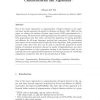Free Online Productivity Tools
i2Speak
i2Symbol
i2OCR
iTex2Img
iWeb2Print
iWeb2Shot
i2Type
iPdf2Split
iPdf2Merge
i2Bopomofo
i2Arabic
i2Style
i2Image
i2PDF
iLatex2Rtf
Sci2ools
AI
2005
Springer
2005
Springer
First order LUB approximations: characterization and algorithms
One of the major approaches to approximation of logical theories is the upper and lower bounds approach introduced in (Selman and Kautz, 1991, 1996). In this paper, we address the problem of lowest upper bound (LUB) approximation in a general setting. We characterize LUB approximations for arbitrary target languages, both propositional and first order, and describe algorithms of varying generality and efficiency for all target languages, proving their correctness. We also examine some aspects of the computational complexity of the algorithms, both propositional and first order; show that they can be used to characterize properties of whole families of resolution procedures; discuss the quality of approximations; and relate LUB approximations to other approaches existing in the literature which are not typically seen in the approximation framework, and which go beyond the "knowledge
Related Content
| Added | 15 Dec 2010 |
| Updated | 15 Dec 2010 |
| Type | Journal |
| Year | 2005 |
| Where | AI |
| Authors | Alvaro del Val |
Comments (0)

